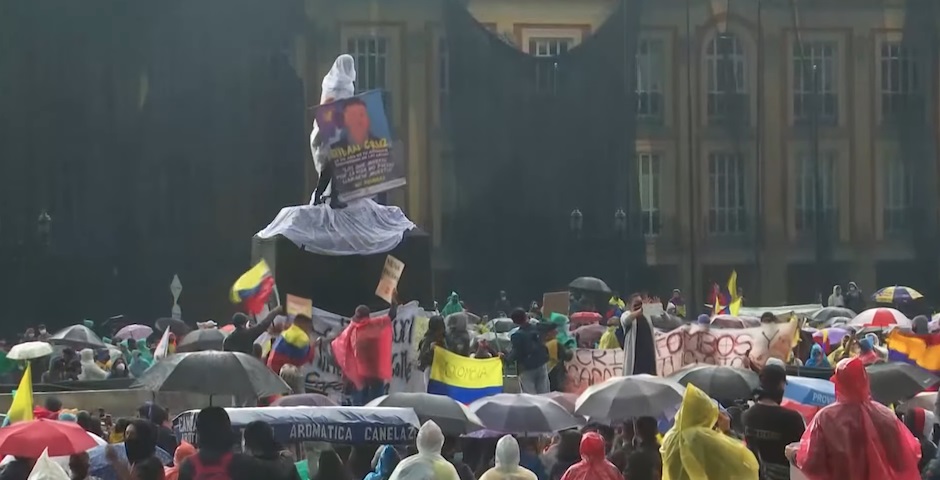“The demonstrations show a number of dissatisfactions, and lay out problems that need to be faced with decision and wisdom”, says a pastor in Bogotá.
 Anti-government protests in Bogotá. / Photo: screenshot video Youtube El Mundo
Anti-government protests in Bogotá. / Photo: screenshot video Youtube El Mundo
At least 24 people have died in Colombia in the heavy clashes between the police and protesters.
Blocked transportations routes, destruction of public infrastructures, and shortage of food and fuel in several cities are also consequences of seven days of protests in the country.
The withdrawal of a controversial tax reform and the resignation of Colombia’s finance Minister have not stopped the demonstrations, many of which have been repressed by the police with excessive violence and abuses, national and international human rights organisations have said.
The demands for a negotiation were responded by Colombia’s President, Iván Duque, who announced he is ready to open a national dialogue with all sectors of society, while fighting violent protestors.
In the midst of this agitated panorama, Colombian evangelical churches have made calls to peace, reconciliation, and prayer. Churches like Casa sobre la Roca of capital city Bogotá have said there must be an open and direct dialogue that isolates insults and violence.
Thousands of members, including high profile social leaders, are members of the church. Darío Silva, its pastor, said in a statement that “the demonstrations of recent days show a number of dissatisfactions and lay out problems that need to be faced with decision and wisdom”.
The respect of the right to protests peacefully is key, Silva underlines, as he celebrated the openness of President Duque to open conversations with social sectors. “If we are equal before God, then we are equal before the state”, he added, asking that all voices are heard.
In the northern city of Cartagena, pastor Miguel Arrázola told Evangélico Digital that the premises of the church he leads had been attacked by vandals. “The situation here has not only escalated in the streets. It is pure terrorism, also in the social media, where thousands of fake profiles are opened to saturate with lies and try to convince the world about supposed massacres of the police and the government”.
He denounced that violents are targeting “all of us, pastors, priests, nuns, both evangelical and Catholic churches, policemen, military, business people… This is why no one dares to point to the origin of all this, and those who do so are timid because of fear of reprisals”.
In Cartagena, Christians gathered outside to pray for Colombia by the emblematic India Catalina monument in the city centre. As they interceded for the country, they wore national emblems.
“In an action of humility, we raise our hands to heaven and we say: ‘Lord Jesus, have mercy on Colombia, Lord Jesus, no more blood shed. We need you, you are just and faithful”, was the prayer led by a young believer.
The Assemblies of God in Colombia conveyed all their churches to three days of national prayer and fasting.
Journalists like Cartagena Mary Rivas opened a Facebook prayer group titled “X Colombia 3 minutos” (For Colombia, 3 minutes).
Evangélico Digital contacted political analyst and former Senate member Carlos Alonso Lucio, but he responded: “I have no good internet connection, we are isolated in our town, not being able to leave. The blockades are leaving us without food and gasoil”.
Colombian journalist Ronald Rodríguez contributed to this article.

Las opiniones vertidas por nuestros colaboradores se realizan a nivel personal, pudiendo coincidir o no con la postura de la dirección de Protestante Digital.
Si quieres comentar o